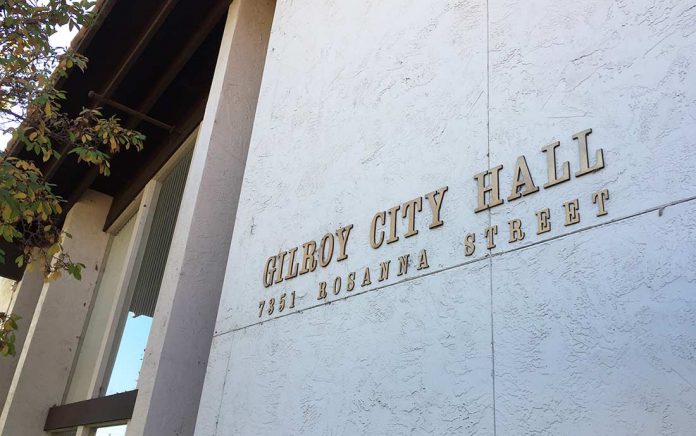A split Gilroy City Council elected not to extend a downtown restaurant’s pandemic-era parklet Dec. 11 as city officials work to create a set of rules for outdoor dining areas in public parking spaces.
The council’s 4-3 vote means Station 55 Seafood and Mexican Cocina’s parklet at 55 Fifth St. must close after Dec. 31. Mayor Marie Blankley and Councilmembers Dion Bracco, Tom Cline and Carol Marques voted not to extend the parklet’s encroachment permit.
The council also directed city staff to conduct a survey of downtown eating and drinking establishments and building owners to gauge their interest in constructing a parklet at their expense. City Administrator Jimmy Forbis said the results of that survey will likely be available by February.
In mid-2020, when restaurants were forced to shut down due to Santa Clara County’s shelter-in-place order, Gilroy approved a temporary program that would allow the businesses to set up parklets to serve guests outdoors.
The program was extended twice, and expired at the end of May.
Only Station 55 Seafood & Mexican Cocina took advantage of the program, constructing a parklet out in front of its Fifth Street location, said Community Development Director Sharon Goei. The parklet in front of Tempo Kitchen & Bar at 7560 Monterey St. was approved in 2017 under a different program.
In August, the council agreed to extend Station 55’s parklet through Dec. 31, which had been closed since the program expired at the end of May.
Goei said the city’s Downtown Parking Management Plan, which was presented in its draft form on Dec. 4, will need to be adopted first before coming up with a formal parklet program, as it contains a number of design standards for parklets.
Cline pointed to the only one application the city received during the temporary parklet program, questioning if there is an “appetite for parklets in Gilroy.”
“I’m trying to understand the drive toward parklets when there’s really not a desire for parklets,” he said.
Councilmember Fred Tovar said the reason why more businesses haven’t come forward is because the city does not have a formal program in place.
“There’s a lot of confusion on how to go about what the city wants,” he said, adding that studies show parklets could boost business’ revenues by up to 30%.
Blankley said she was uncomfortable extending Station 55’s parklet, because as it currently stands, no other business can be approved for such an area until a program is adopted.
“It isn’t right in my opinion to have one that stays beyond that extended time when there was no explanation of that when they got the permit,” she said. “Everything ought to be fair for all, and today nobody else can do a parklet the way Station 55 has done.”
Tovar disagreed, saying every business had an opportunity to apply for the temporary program during the pandemic but chose not to do so. The city “dropped the ball” by not creating design standards when it approved the temporary program in 2020, he noted.
“To penalize [Station 55] because we don’t have anything in place currently is wrong,” Tovar said.
Tovar’s motion to extend the restaurant’s parklet until the city adopts a formal program failed, with only himself and Councilmembers Rebeca Armendariz and Zach Hilton voting in support.
After the 4-3 vote was made to not extend the parklet, Tovar shook his head and muttered “killing our businesses,” which was picked up by the microphone.
Blankley told Tovar that the “after commentary thing is not really professional,” which caused Tovar to respond by asking her, “how many times when someone says something you interrupt us or you make a comment?”
“I feel unprofessional, but I respect you, so please just be careful with what you say,” Tovar said.
City to submit grant for ‘Vehicle Miles Traveled’ policy
The council also approved a resolution that supports applying for a state grant to fund a “Vehicle Miles Traveled” policy for new developments.
The vote was 5-2, with Bracco and Tovar dissenting and other members concerned that such a policy could eventually create a tax for commuters.
Beginning in 2018, state law required cities to evaluate transportation impacts of new developments through ways of reducing greenhouse gas emissions and promoting other means of transportation instead of personal vehicles.
Known as Vehicle Miles Traveled, the method measures the total amount of driving attributed to a project.
Gilroy’s 2040 General Plan calls for the creation of such a policy, Goei said, which would provide developers with a “menu of mitigation measures to choose from,” including building bicycle paths and providing access to public transportation facilities.
“By having a policy like this, it can help reduce vehicle emissions, which reduces the pollutants in our environment and help benefit the community overall,” she said.
Forbis added that the city is already doing the work, but in an inefficient way.
“Each time a project comes in, we’re getting a consultant who then develops a one-off VMT program as opposed to having a comprehensive VMT program that we can use for all projects,” he said. “It will actually help the developers get through the process faster.”
But after some councilmembers questioned if the policy would add a mileage tax for commuters, Goei said no such tax is being proposed.
Still, both Marques and Blankley said they were giving a “reluctant” affirmative vote to submit the grant application.
“If our vehicle miles don’t get reduced … that is going to be a great big issue since we are such a commuter city,” Marques said. “California pays the highest gas taxes in the country to lower our emissions, and now that still isn’t enough. Now we have to do Vehicle Miles Traveled. I’m just not convinced. I think this is going to hurt our citizens with something else coming out of their paychecks.”














